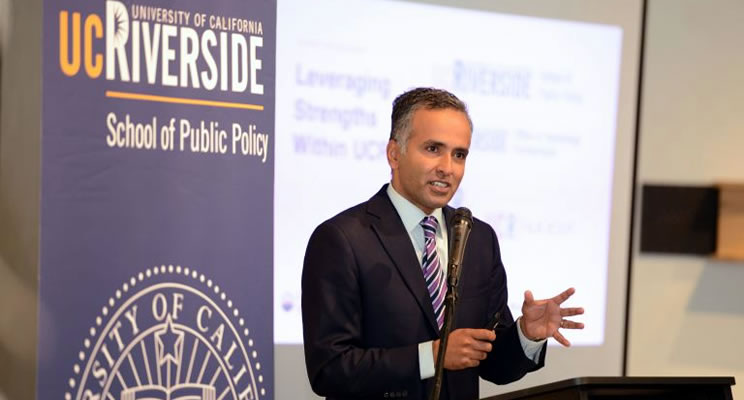Above photo: Director Karthick Ramakrishnan introduced UCR’s new Center for Social Innovation during a reception held Feb. 9.
Riverside, Ca. – University of California, Riverside has launched the Center for Social Innovation (CSI), which seeks to flip the script about Inland California’s reputation as an “area of need.”
Introduced during a launch event held Friday, Feb. 9, at the Riverside Art Museum, UCR’s Center for Social Innovation (CSI) aims to emphasize the Inland Empire’s potential as a hub of innovation.
Nearly 150 state and local leaders attended the center’s launch event, including James Irvine Foundation President and CEO Don Howard, Weingart Foundation President and CEO Fred Ali, Central Valley Community Foundation President and CEO Ashley Swearengin, Assemblyman Jose Medina, D-Riverside, and Riverside Mayor Rusty Bailey. UCR Chancellor Kim A. Wilcox addressed the crowd, detailing the university’s role in supporting Inland innovation at the community level.
With the goal of sparking renewed investment in the area, the center will bring together local researchers, various community and nonprofit organizations, and civic stakeholders looking to form long-term partnerships.
It embarks upon this mission with initial funding from the San Francisco-based James Irvine Foundation and the Weingart Foundation of Los Angeles.
“People think innovation in California happens only on the coast, from biotech in San Diego to high tech in Silicon Valley,” said CSI Founding Director Karthick Ramakrishnan. “By contrast, they think of Inland California primarily as an area of poverty and need, failing to recognize the important innovation happening in the region.”
The result of two years of collaborative planning, the center comprises four UCR faculty-led research groups focused on key areas with policy implications for the Inland region: immigration research, civic engagement, economic mobility, and leadership and entrepreneurship.
The working groups, Ramakrishnan explained, will function as gateways to community engagement by spearheading research projects relevant to the Inland region, hosting signature events, and forging relationships with local leaders.
“By decentralizing our work and allowing each group to be agile and adaptive, we can better build bridges across the Inland region,” he said. “At our core, we believe we can advance research on critical issues facing this region while helping to build and grow local community organizations.”
The Center for Social Innovation—which is the result of two years of planning, community engagement, and foundation dialogue—aims to provide a credible research voice that spurs civic leadership and policy innovation. Find out more at http://socialinnovation.ucr.edu/

